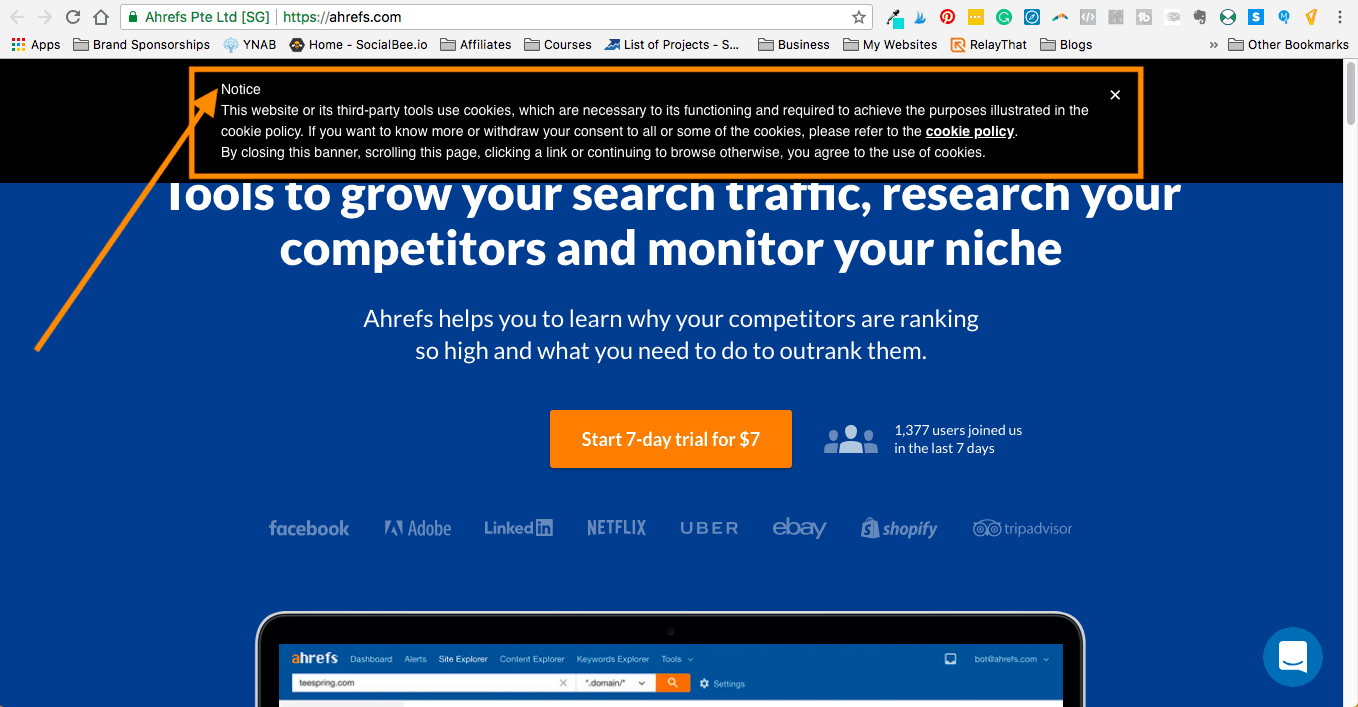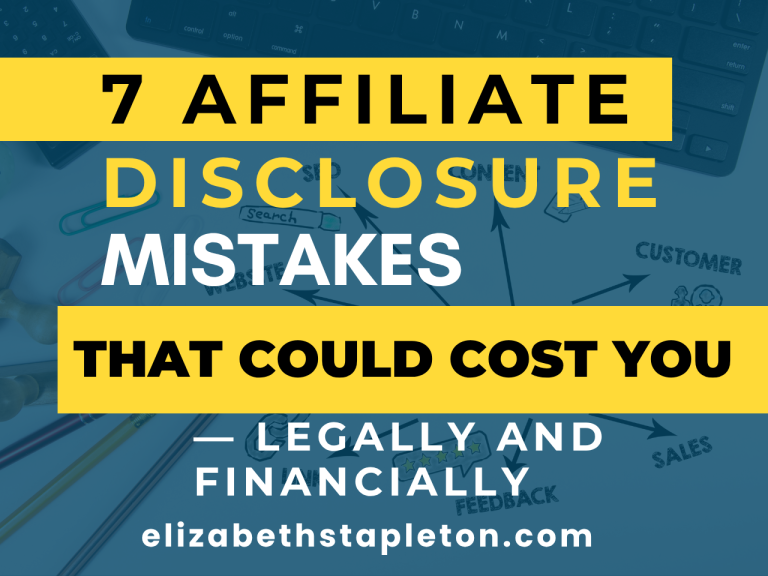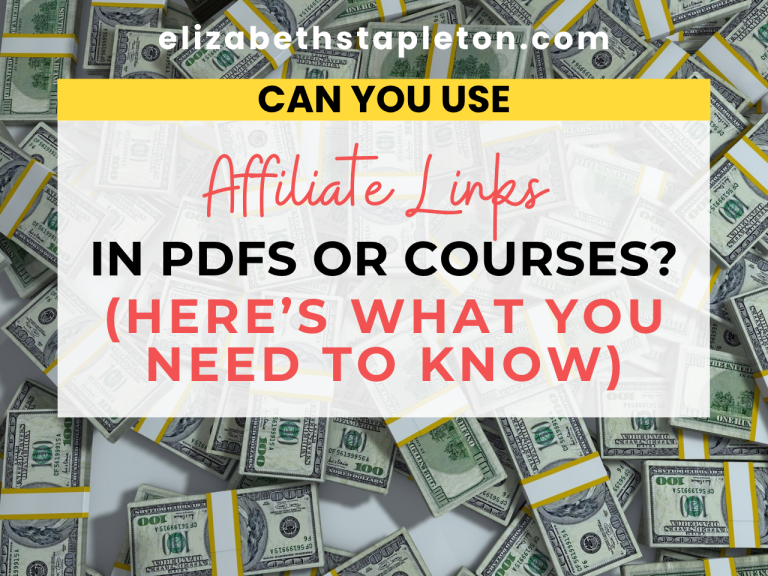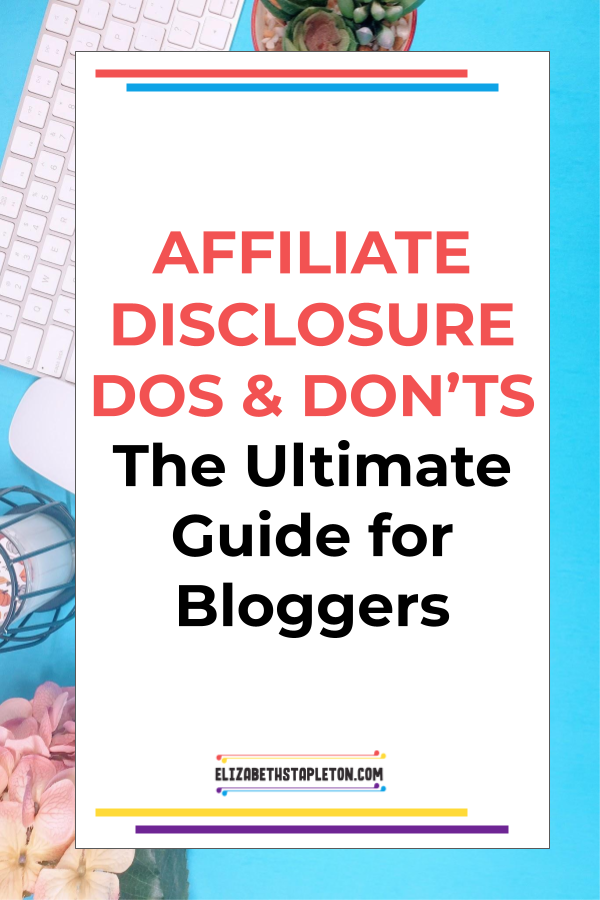What You NEED to Know About Blogging Disclosures
I think you’ll agree that being able to keep the money you make from blogging is great. Most people know they need blogging disclosures, but don’t know what they should say or where it should be.
In today’s post, I’m going to show you why blogging disclosures are important, as well as what they should include and where they should be displayed.
Just so you know, this post may contain affiliate links. Meaning I receive commissions for purchases made through those links, at no cost to you. I have experience with all of these companies, and I recommend them because they are helpful and useful. You can read my disclosure policy for more info.
Why You Need Blogging Disclosures
If you’re like most bloggers who monetize your site, you are likely using one if not more of the following to monetize:
- Ads
- Affiliate Links
- Email list sign up forms
- Selling products
To make sure you get to keep the money you earn you’ll want to make sure you are in compliance with everything.
Which means you will need to include the proper policies and disclosures on your website.
At its core, the legal requirements aim to ensure you are being honest and transparent with your audience. You have to let your readers know what information you are collecting from them and why.
As well as if you have any vested interest when it comes to links.
It’s not only required but it helps to build trust with your audience. Since you are being, upfront, honest, and transparent, your audience can trust what you have to say.
What Makes Such Blogging Disclosures Required?
There are a few different laws that require you to disclose your relationship and the information you collect.
The Federal Trade Commission has endorsement guidelines that break down in detail what constitutes a proper disclosure, as well as where such disclosures should take place. This includes disclosing any affiliate link included on a blog post or you were paid to do a sponsored post, or received free products to review.
Additionally, the General Data Protection Regulation, more commonly known as GDPR requires companies and websites like yours to get consent to collect information and to let people know all of the information you are collecting.
While there are those specific requirements, some other disclaimers you’ll need to include on your site will depend on the type of website you have. As well as what you are doing with the site.
A Quick Disclaimer
Since we are talking about disclosures and disclaimers I need to go ahead and give you one. So here is an example of a professional disclaimer:
While I am an attorney, I am not your attorney and nothing on this website or downloads available are to be construed as creating an attorney-client relationship. Additionally, nothing in this site or resources made available are to be considered legal advice. The author is not liable for any losses or damages related to actions or failure to act related to the content in this website. If you need specific legal advice consult with an attorney who specializes in your subject matter and jurisdiction.
What is Required for a Disclosure
Now that you know why blogging disclosures are important, let’s dig into what should actually be included in your disclosures on your posts as well as your “legal” page.
What is required will depend on what you are doing, here are some things you need to either disclose or disclaim:
- An affiliate/sponsored relationship – disclose your vested interest
- A professional license – disclaim professional advice
- Using cookies – cookie consent
- Email sign up forms – privacy policy
- Requiring a name and/or email for comments – privacy policy
Affiliate Marketing
The FTC guidelines explain how you must disclose any vested interest you have for example, either as an affiliate or if you received products and services in exchange for a blog post.
You must give notice to your audience, whether that link is used in a blog post, social media, or an email.
If you are not following the rules (at least here in the US) you could be forced to give up the money you earned through the misleading links.
Since the rules also apply to your affiliate partners and they could also be fined. They may even drop you as an affiliate if you are not complying.
Additionally, some affiliate programs have specific requirements in the disclosures they want you to show.
One well-known example would be Amazon affiliates. Amazon requires that you have very specific language in your disclosure on posts or pages where you include affiliate links. As well as on the page where you outline your legal policies.
Amazon is also well known for not allowing cloaking of affiliate links. Meaning you cannot use PrettyLink for Amazon Affiliate links. Here is an example of a cloaked link:
Affiliate Link: https://makingsenseofaffiliatemarketing.com/?affcode=57702_ynoql56_
Cloaked with Pretty Link: https://elizabethstapleton.com/affiliatemarketing
Professional Disclaimer
If you are a professional, say a lawyer, doctor, or financial advisor you want to make sure that your audience knows that your content is for informational purposes only and is not to be considered professional advice.
One example of one would be what I shared earlier in this post. Different professions will have different requirements about what you can and cannot post but a disclaimer is always wise.
Use of Cookies
You may not be aware that your site uses cookies, but chances are it does. It’s usually certain plugins that create and use cookies to make your site more user-friendly.
GDPR requires that if you use cookies that collect personal data, you get consent for that collection. Which is why you now see every site with a banner having your consent to the cookies being used.

Email Sign Up Forms
Gone are the days of getting someone on your email list by offering a freebie. They must consent to receive emails from you and that consent cannot be conditional on getting the freebie. You can thank GDPR for that one.
Either way, if you are collecting emails you need to share with the user what you are doing with that information and how long you keep the information.
Comments
While commenting doesn’t get someone on your email list, if your comment system requires the commenter to enter their name and email, GDPR requires you to share why you collect the information and how they can invoice their right to forget.
You can learn more about these requirements by reading my GDPR Guide.
How to Disclose
Some disclosures, like those for affiliate marketing, require the disclosure to be on the page before the link, but others just need to be included in your site’s privacy policy. If you most of your posts contain affiliate links it is wise to automatically include a disclosure.

One way to accomplish this is to use the plugin, Ad Inserter. Yes, you can use it to manage your ads on your site but you can also use it to make sure your disclosure shows at the top of every post.What you do is you type in the disclosure including the link to your disclosure page and then you set the display rules.
The block I use to display my use of affiliate links.
However, since I don’t always have Amazon links on every page or post, I only show it when I enable it for the specific post.

Because another very important aspects of your disclosure is that you’re not hiding it. It has to be above any links.
You must see that disclosure before you see anything that is going to make you money. If you’re hiding it, by, for example, putting at the bottom of the post after the links then you’re violating the law.
You also don’t want to put it in your sidebar because typically on mobile the sidebar content is below your post content and therefore doesn’t’ satisfy the requirements.
What to Language to Use for Affiliate Marketing
So we’ve covered why and where to place disclosures, now let’s dig into what language and information you need to include.
Disclosures must be clear and conspicuous. Which means above the fold and easy to see and read. They must also use plain language.
The FTC has specifically said that the language, “affiliate marketing” might not be understood by your intended audience. You need to spell it out.
Be open and honest about your marketing and affiliate relationships.Think of it his way, if it wouldn’t be easily understood by your Grandma or a young child, it probably wouldn’t pass the standard required by the FTC. Being clear and concise is the perfect way to use “legal jargon”
Here is the language I’ve used:
THIS PAGE MAY CONTAIN AFFILIATE LINKS. MEANING I RECEIVE COMMISSIONS FOR PURCHASES MADE THROUGH THOSE LINKS, AT NO COST TO YOU. PLEASE READ MY DISCLOSURE FOR MORE INFO.
This is my current disclosure:
Just so you know, this post may contain affiliate links. Meaning I receive commissions for purchases made through those links, at no cost to you. Please understand that I have experience with all of these companies, and I recommend them because they are helpful and useful, not because of the small commissions I make if you decide to buy something. You can read my disclosure policy for more info.
What Language to Use for Professional Disclaimers
The exact language you should use is going to vary depending on your profession, I recommend checking any sort of membership or licensing agency of your profession for guidance.
What Disclosures to Include on Your Site’s Legal Page
There are a number of items you will need to include on this page. Even if you aren’t collecting email addresses or using affiliate marketing. If all you allow is commenting on your site or you use Google Analytics, you still need to outline your site’s privacy policy somewhere.
Privacy Policy
In your Privacy Policy you need to explain what personal and anonymous information you collect and how you use that information.
For example, if you use Google Analytics, you are collecting anonymous information. This information includes where the user is from as well as demographic information such as their age and gender.
If you collect email addresses through forms, you need to say you are collecting the personal information (name and email address) that they submit on the form in your site. As well as the purpose of that information.
Remember disclosures are all about being upfront and honest with your audience, so any information that is being collected and used must be disclosed.
Links to Other Sites
When you do affiliate marketing or are just sharing links to other websites you need to ensure your users know that you are not responsible for the content of those other sites.
Additionally, you need to let your readers know that those sites will likely have their own privacy policies that the reader should take note of.
You’ll also want to include any specific disclosures required by affiliate partners. Such as Amazon’s requirement that you include:
[site] is a participant in the Amazon Services LLC Associates Program, an affiliate advertising program designed to provide a means for sites to earn advertising fees by advertising and linking to Amazon.com
Topical or Professional Disclaimers
If you write on a topic of which you are not a licensed professional you need to say so. For example, on my personal finance website, as I am not a financial advisor, I share in my disclaimer that the site is for informational and entertainment purposes only. That I am sharing my personal experience which may not be applicable to others.
If you write on a topic for which you are a professional, you will likely want to include a disclaimer that you are not writing in the capacity of your profession. For example, on this site, I include a disclaimer about being an attorney, but that I am not your attorney and the content provided is for informational purposes only and does not constitute legal advice.
Terms and Conditions
Depending on how your website is run, you may also want to include some terms and conditions for your site. In fact the Terms & Conditions maybe it’s own separate page on your website.
Terms and Conditions typically address appropriate user behavior and perhaps any refund policy you have in regards to the products or services you sell.
Bottom Line for Blogging Disclosures
To ensure your blog or website is on the right side of the law, being upfront and honest through disclosures is more than a good idea, it’s an absolute necessity.
You don’t want to lose the money you earned, simply because you forgot to include a disclosure in your post. Fortunately, technology makes it easy to ensure you are sharing the proper disclosures when necessary.
To help those in my community, I’ve created a checklist of what should be included on a blog’s legal page. You can join my community and get access to freebies like this checklist by subscribing below. Or you can buy the Website Legal Templates I’ve created.
Last updated: January 2019
Was this post helpful? Be sure to pin it on Pinterest!





